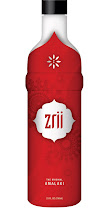Zrii has several herbs and fruits in it, making it a synergistic blend. Meaning everything works more effectively when the are combined with other nutrients!
Here's what I found regarding Schisandra on the Net:
History and Uses:Schisandra, also spelled Schizandra, is a woody vine with numerous clusters of tiny, bright red berries. It is found throughout northern and northeast China and the adjacent regions of Russia and Korea. The fully ripe, sun-dried fruit is used medicinally, and it has a sour, sweet, salty, hot and bitter taste.
This unusual combination of flavors is reflected in Schisandra's Chinese name, wu-wei-zi, meaning "five taste fruit."
In China, Schisandra is also used to increase "the water of the genitals," referring to its use in nourishing sexual fluids. It is also said to "calm the heart and quiet the spirit." Long term use is said to help to beautify the skin. Schisandra is also said to build wei chi, the defense energy of the body, so one is better able to resist infection. Schisandra is listed among China's most important herbs, and Chinese herbal medicine described Schisandra as a high-grade herbal drug useful for a wide variety of medical conditions - especially as a kidney tonic and lung astringent.
Chinese herbalists still use Schisandra for coughs, night sweats, insomnia, thirst and physical exhaustion. Schisandra is currently popular worldwide as a tonic, and in Asia, it is used as a food source. Schisandra Berry helps the body adapt to stress and nourishes the nervous system. Modern Chinese research suggests that lignins in Schisandra regenerate liver tissue damaged by harmful influences such as viralhepatitis and alcohol. Lignins are thought to lower blood levels of serum glutamic pyruvic trans-aminase (SGPT), a marker for infective hepatitis and other liver disorders.
Schisandra fruit may also have an adaptogenic action, much like the herb Ginseng (Panax), but
with weaker effects. Laboratory work suggests that Schisandra may improve work performance, build strength and help to reduce fatigue. It is also used as a mild sedative. Using the berries internally is thought to help the body to better utilize oxygen, thereby improving human endurance.
In China, a few berries are chewed daily for one hundred days in a row as a tonic to improve co-ordination and concentration. In the treatment of hepatitis, Schisandra has demonstrated a 76% success rate without harmful side effects. The primary chemical constituents of this herb include sesquicarene, lignins (schizandrin, deoxyschizandrin, gomisin), schizoandrol, citral, phytosterols (stigmasterol, beta-sitosterol), vitamins C and E, essential oils and numerous acids.
Recommended Dosage:


No comments:
Post a Comment